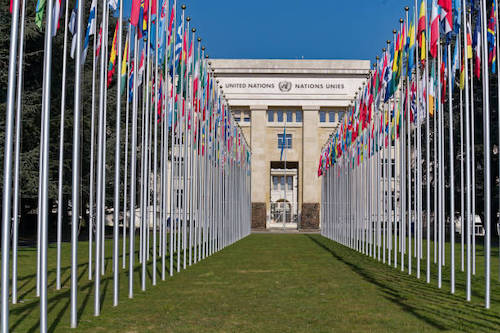Geneva brands itself as the humanitarian capital of the world. Its ecosystem of UN agencies, international organisations and NGOs contribute to what is known as “International Geneva”. Yet since the arrival of President Trump in the Oval Office, international Geneva has been facing an existential crisis.
Many of these organisations depend heavily on US funding – in some cases it accounts for up to 25% of their budget. On top of this European donors are shifting development budgets to military spending and the UN has itself launched an initiative - UN80 - to downsize in order to be more efficient.
In these uncertain times, leadership communication is more important than ever.
Heads of organisations are having to make tough decisions on the programmes they cut, the contracts they don’t renew and the people they fire. According to local media 30,000 jobs are expected to go.
In times of crisis the ways leaders communicate can determine whether people feel trust, clarity and resilience or confusion and fear. More generally if done well it can drive change and enhance performance. Successful leaders influence guide and inspire others towards a share goal.
It is not just what they say, but how they listen, connect, motivate and align their message with their actions.
I have coached and trained senior managers, directors and the C-suit in how to master
leadership communication, based on many years’ experience as an international journalist and spokeswoman handling crises.
Below are some of the top tips in how to communicate to your team or at a Town Hall during a time of crisis or significant change:
- Be transparent and honest – share what you know, what you don’t know and what you are doing to find out. Avoid sugarcoating as this can dent your credibility later on.
- Communicate frequently – in a crisis, silence creates uncertainty so provide regular updates.
- Show empathy – acknowledge fears and anxiety by using language that connects emotionally such as “I know this is difficult for many of you …”
- Be clear and concise by focusing on the essentials of what people need to know, feel and do.
- Summarise what you are going to do as leader and what you are going to ask the team to do.
- Listen actively and respond respectfully to questions.
- Provide a vision for the future even it is uncertain that talks to recovery, growth or adaptation
- Align words with actions as if what you say and what you do are inconsistent, you will destroy trust. You need to walk the talk!
Claire Doole Communications runs leadership communications workshops and coaches senior leaders in how to communicate with purpose, clarity and connection.
Up to 30,000 jobs could go in Geneva as result of funding cuts and UN reform, according to local Swiss media. "International Geneva" is facing an existential crisis.
If you are a leader breaking bad news to your staff,
leadership communications skills are more important than ever, as I outline in this blog.
Author's bio
 Claire Doole is a former BBC correspondent and international spokeswoman who is passionate about helping people communicate with confidence. Since 2006, she has successfully trained hundreds of professionals in the art of presenting and public speaking, talking to the media, managing communications in a crisis, and writing for the web. In addition, she has coached C-level executives and public figures to give powerful TEDx and TED style talks in Europe and the Middle East. A Swiss and UK national, Claire trains and coaches in French and English.
Claire Doole is a former BBC correspondent and international spokeswoman who is passionate about helping people communicate with confidence. Since 2006, she has successfully trained hundreds of professionals in the art of presenting and public speaking, talking to the media, managing communications in a crisis, and writing for the web. In addition, she has coached C-level executives and public figures to give powerful TEDx and TED style talks in Europe and the Middle East. A Swiss and UK national, Claire trains and coaches in French and English.
Claire is also a highly experienced moderator having facilitated panel discussions with government ministers, NGO activists, humanitarians and human rights specialists at major events.
Claire helps clients design their virtual, hybrid and in-person events and runs workshops on organising and moderating at events.
www.doolecommunications.com

 Claire Doole is a former BBC correspondent and international spokeswoman who is passionate about helping people communicate with confidence. Since 2006, she has successfully trained hundreds of professionals in the art of presenting and public speaking, talking to the media, managing communications in a crisis, and writing for the web. In addition, she has coached C-level executives and public figures to give powerful TEDx and TED style talks in Europe and the Middle East. A Swiss and UK national, Claire trains and coaches in French and English.
Claire Doole is a former BBC correspondent and international spokeswoman who is passionate about helping people communicate with confidence. Since 2006, she has successfully trained hundreds of professionals in the art of presenting and public speaking, talking to the media, managing communications in a crisis, and writing for the web. In addition, she has coached C-level executives and public figures to give powerful TEDx and TED style talks in Europe and the Middle East. A Swiss and UK national, Claire trains and coaches in French and English.





